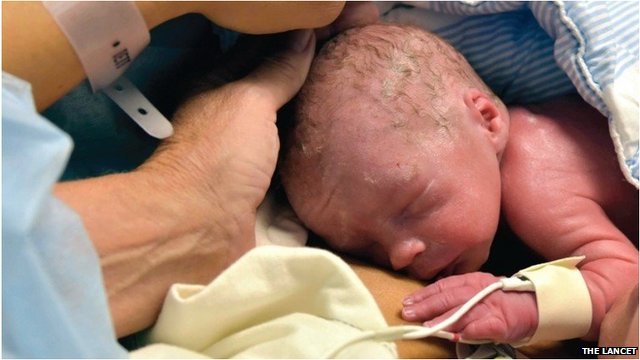First picture of womb-transplant baby released
The first picture of first baby to be born from a transplanted womb has been made public by his parents.
The baby boy’s birth took place in Sweden after surgeons at the University of Gothenburg performed the pioneering transplant procedure.
He was delivered by caesarean section in the 31st week of pregnancy and weighed 3.9 pounds – normal for that stage of pregnancy.
Both mother and child are now at home and said to be doing well.
The identity of the parents, a Swedish couple, has not been released, but the baby’s father said: “It was a pretty tough journey over the years, but we now have the most amazing baby.
“He is very, very cute, and he doesn’t even scream, he just murmurs.”
He added: “He’s no different from any other child, but he will have a good story to tell. One day he can look at the newspaper articles about how he was born and know that he was the first in the world to be born this way.”
The father spoke as the first picture of the baby was published, amid widespread excitement over a procedure which offers renewed hope to thousands of infertile women around the world.
The birth of the Swedish baby is understood to have taken place within the last month, after doctors transplanted wombs into several women who had a rare genetic condition that meant they were born without their own womb.
In January, one of the patients underwent IVF treatment that resulted in an embryo being transferred to her new womb. The donated womb came from a 61-year-old woman, a close family friend who had gone through menopause after giving birth to two children.
The 35-year-old mother is a patient of Dr. Mats Brannstrom, professor of obstetrics and gynaecology at the Sahlgrenska Academy in Gothenburg.
The mother had to take three medicines to prevent her body from rejecting the new organ. About six weeks after the transplant, she got her menstrual period – a sign the womb was healthy.

The baby boy’s birth took place in Sweden after surgeons at the University of Gothenburg performed the pioneering transplant procedure (photo Lancet)
After one year, when doctors were confident the womb was working well, they transferred a single embryo created in a lab dish using the woman’s eggs and her husband’s semen.
The woman, who has only one kidney, had three mild rejection episodes, including one during pregnancy, but all were successfully treated with medicines.
The baby’s growth and blood flow to the womb and umbilical cord were normal until the 31st week of pregnancy, when the mother developed preeclampsia, a dangerous high-blood-pressure condition.
After an abnormal fetal heart rate was detected, the baby was delivered by cesarean section.
Prof. Mats Brannstrom, who led the research and delivered the baby with the help of his wife, a midwife, said: “The baby is fantastic. But it is even better to see the joy in the parents and how happy he made them.
“That was a fantastic happiness for me and the whole team, but it was an unreal sensation also because we really could not believe we had reached this moment. Our success is based on more than 10 years of intensive animal research and surgical training by our team and opens up the possibility of treating many young females worldwide that suffer from uterine infertility.”
Liza Johannesson, a gynaecological surgeon on the team, said: “It gives hope to those women and men that thought they would never have a child, that thought they were out of hope.”
The Swedish couple, both competitive athletes, will have to decide shortly if they want a second baby.
The drugs used to prevent the womb being rejected would be damaging in the long term – so the couple will either try again or have the womb removed.
The father said: “We will definitely think about that. But right now, we’re very happy with just one baby.”
After the caesarean section, the womb would be left in place until the mother has completed her family and then removed so that drugs to stop the body rejecting the organ could be halted. The drugs carry an increased risk of cancer.
The operation, follow-up and immunosuppressant drugs cost $160,000, with the research paid for by the Jane and Dan Olsson Foundation for Science, a Swedish charity.
The only other options for women born without a womb were adoption or surrogacy if she wanted to have a child genetically related to her, but this is legally complicated.
Doctors around the world have welcomed the first successful birth from a transplant.
The first womb transplant was done in Saudi Arabia in 2000 but failed shortly afterwards.
In 2011 Derya Sert, 21, received a womb from a dead donor in Turkey. She conceived a child but no heartbeat was detected and it was later terminated.
In 2012 it was announced by Dr. Mats Brannstrom that nine womb transplants had been carried out and all were successful.
Eight of the recipients suffer from MRKH syndrome, a congenital disorder which affects one in 5,000 women and prevents the womb from developing.
The ninth had her womb removed after suffering cervical cancer.
The only other options for women born without a womb is adoption or surrogacy if she wants to have a child genetically related to her.
[youtube 59aBl1zWsAc 650]
